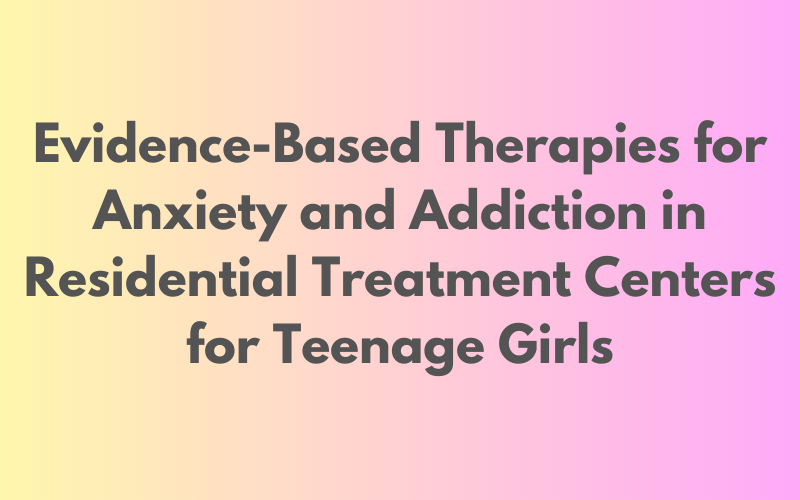Residential treatment centers play a crucial role in helping teenage girls with anxiety and addiction issues overcome their challenges. These facilities provide a safe and supportive environment where evidence-based therapies are employed to address their unique needs. In this article, we will explore the various evidence-based therapies used in teen residential treatment centers specifically tailored for teenage girls struggling with anxiety and addiction.
Understanding the Challenges:
Teenage girls battling anxiety and addiction require specialized care to promote their overall well-being. These conditions often intersect, exacerbating the severity of their struggles. Residential treatment centers recognize the importance of evidence-based therapies in helping these girls regain control over their lives and achieve lasting recovery.
Evidence-Based Therapies:
Cognitive-Behavioral Therapy (CBT):
CBT is a widely recognized evidence-based therapy used in residential treatment centers for teenage girls with anxiety and addiction. This therapy focuses on identifying negative thoughts and patterns and replacing them with healthier, more positive ones. CBT equips girls with the skills to manage their anxiety and addiction triggers effectively.
Dialectical Behavior Therapy (DBT):
DBT is another effective evidence-based therapy that residential treatment centers employ. It aims to improve emotional regulation, interpersonal effectiveness, distress tolerance, and mindfulness. DBT helps teenage girls develop coping mechanisms, navigate relationships, and handle intense emotions.
Mindfulness-Based Stress Reduction (MBSR):
MBSR is a therapeutic approach that combines mindfulness meditation, yoga, and body awareness. It assists teenage girls in cultivating awareness of their thoughts, emotions, and physical sensations. MBSR encourages self-compassion, stress reduction, and emotional well-being, making it valuable in addressing anxiety and addiction.
Trauma-Focused Therapies:
Many teenage girls with anxiety and addiction have experienced traumatic events. Residential treatment centers provide evidence-based trauma-focused therapies, such as Eye Movement Desensitization and Reprocessing (EMDR) and Trauma-Focused Cognitive Behavioral Therapy (TF-CBT). These therapies help girls process and heal from their past traumas, reducing their impact on current anxiety and addiction issues.
Family Therapy:
Family involvement is crucial in the recovery process for teenage girls with anxiety and addiction. Residential treatment centers incorporate evidence-based family therapy, fostering open communication, and addressing familial dynamics. This approach strengthens support systems and provides a stable foundation for girls’ long-term recovery.
Conclusion:
Residential treatment centers for teenage girls with anxiety and addiction employ a range of evidence-based therapies to address their complex needs. By incorporating therapies such as CBT, DBT, MBSR, trauma-focused therapies, and family therapy, these centers create a comprehensive treatment plan that fosters lasting recovery. If you have a teenage girl struggling with anxiety and addiction, consider the effectiveness of evidence-based therapies offered by residential treatment centers to support her journey towards healing and wellness.
Frequently Asked Questions
Which evidence-based therapies are commonly used in residential treatment centers for teenage girls with anxiety and addiction?
Residential treatment centers for teenage girls with anxiety and addiction often employ evidence-based therapies such as Cognitive Behavioral Therapy (CBT), Dialectical Behavior Therapy (DBT), and Acceptance and Commitment Therapy (ACT).
How does Cognitive Behavioral Therapy (CBT) help teenage girls with anxiety and addiction in residential treatment centers?
CBT is a widely used evidence-based therapy that helps teenage girls in residential treatment centers by identifying and changing negative thought patterns and behaviors associated with anxiety and addiction, promoting healthier coping mechanisms and enhancing overall well-being.
What is the role of Dialectical Behavior Therapy (DBT) in residential treatment centers for teenage girls with anxiety and addiction?
DBT is an evidence-based therapy that plays a crucial role in residential treatment centers for teenage girls with anxiety and addiction. It focuses on teaching skills related to emotional regulation, distress tolerance, interpersonal effectiveness, and mindfulness, helping them manage their anxiety and addiction effectively.
How does Acceptance and Commitment Therapy (ACT) contribute to the treatment of anxiety and addiction in residential centers for teenage girls?
ACT is an evidence-based therapy utilized in residential treatment centers for teenage girls with anxiety and addiction. It emphasizes accepting difficult emotions and experiences while committing to actions that align with personal values, promoting psychological flexibility and reducing anxiety and addiction-related behaviors.
Are there any other evidence-based therapies used in residential treatment centers for teenage girls with anxiety and addiction?
Yes, in addition to CBT, DBT, and ACT, other evidence-based therapies commonly used in residential treatment centers for teenage girls with anxiety and addiction include Mindfulness-Based Cognitive Therapy (MBCT), Motivational Interviewing (MI), and Family Therapy.
How does Mindfulness-Based Cognitive Therapy (MBCT) benefit teenage girls with anxiety and addiction in residential treatment centers?
MBCT is an evidence-based therapy that combines mindfulness practices with elements of cognitive therapy. It helps teenage girls in residential treatment centers develop awareness of their thoughts, emotions, and bodily sensations, fostering self-compassion and reducing anxiety and addiction-related distress.
What is the significance of Motivational Interviewing (MI) in the treatment of anxiety and addiction in residential centers for teenage girls?
Motivational Interviewing is an evidence-based therapy employed in residential treatment centers for teenage girls with anxiety and addiction. It aims to enhance intrinsic motivation and commitment to change by exploring and resolving ambivalence, helping girls overcome their anxiety and addiction-related challenges.
How does Family Therapy contribute to the overall treatment of teenage girls with anxiety and addiction in residential centers?
A8: Family Therapy is an evidence-based therapy that involves the participation of the entire family in the treatment process. It addresses the impact of anxiety and addiction on family dynamics and relationships, fostering understanding, communication, and support, which greatly contributes to the well-being and recovery of the teenage girls.
